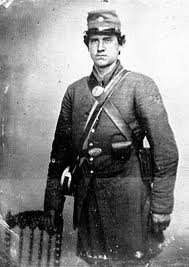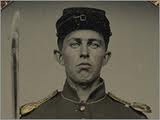 Tennessee Volunteers enlisted in the Union Army by the ten’s of thousands and many of these Civil War heroes were Sevier County Patriots. Most of the males of Eastern Tennessee either journeyed to Kentucky to sign up or found a recruiting officer, that wasn’t too scared of retribution, in order to join the Union cause locally. They came in droves, some too young, some too old and many just the right age. Most joined, grouped by family, last name, brothers, fathers, children, cousins, distant cousins and some relations not thoroughly known or understood. The Sevier County Patriots knew that this conflict was not going to be any picnic. Most Tennessee Volunteers, had neighbors, in some cases relatives, that supported the Rebellion and knew that the confrontations to come were going to be tragic and bloody. What they had no way of knowing, was how long the nightmare would last or how the Civil War would affect their way of life for generations.
Tennessee Volunteers enlisted in the Union Army by the ten’s of thousands and many of these Civil War heroes were Sevier County Patriots. Most of the males of Eastern Tennessee either journeyed to Kentucky to sign up or found a recruiting officer, that wasn’t too scared of retribution, in order to join the Union cause locally. They came in droves, some too young, some too old and many just the right age. Most joined, grouped by family, last name, brothers, fathers, children, cousins, distant cousins and some relations not thoroughly known or understood. The Sevier County Patriots knew that this conflict was not going to be any picnic. Most Tennessee Volunteers, had neighbors, in some cases relatives, that supported the Rebellion and knew that the confrontations to come were going to be tragic and bloody. What they had no way of knowing, was how long the nightmare would last or how the Civil War would affect their way of life for generations.
The Sevier County Patriots showed up to enlist riding a mule or horse, most on foot, some bearing a knife, fowling-piece or ancient musket, blanket, a burlap or canvas bag, for vittles, a slouch felt, straw hat or clothe cap, coat and maybe shoes or boots if available. All had been told by the elders, what to expect, but these recollections were from previous wars and the horrors to come, surpassed any description these old veterans could fathom.
Some of the older men and youngest boys were delegated by family, to remain on the home front, in order to oversee the farms and possibly protect kinsfolk from the reprisal of the Rebel raiders and partisans that plagued Eastern Tennessee. This in no way denigrated these, stay-at-home, Sevier County Patriots and in some cases, the farm or home was more perilous than the front. Many of the youngest Tennessee Volunteers saw only the glory and adventure of battle and were anxious to experience the thrill of suppressing the rebellion. The carnage of battle, would soon dispel any preconceived illusions these youthful volunteers imagined.
 When these Tennessee Volunteers and Sevier County Patriots were officially mustered into a Union Unit, most received a new, ill-fitting, woolen Federal Uniform, a kepi, forage cap or broad-brimmed felt hat, fall-apart brogan shoes, a belt set that included a cartridge box, cap box, bayonet and scabbard, a haversack for rations, a canteen, and a blanket roll or knapsack, which contained a wool blanket, a shelter half and perhaps a rubber blanket or poncho. Inside was a change of socks, writing paper, stamps and envelopes, ink and pen, razor, toothbrush, comb and other personal items and of course a slightly jaded muzzle-loading long gun. These Mexican War relics were soon to be replaced by the more accurate and reliable, 1861 Springfield Rifle and still later by the 1863 Springfield version.
When these Tennessee Volunteers and Sevier County Patriots were officially mustered into a Union Unit, most received a new, ill-fitting, woolen Federal Uniform, a kepi, forage cap or broad-brimmed felt hat, fall-apart brogan shoes, a belt set that included a cartridge box, cap box, bayonet and scabbard, a haversack for rations, a canteen, and a blanket roll or knapsack, which contained a wool blanket, a shelter half and perhaps a rubber blanket or poncho. Inside was a change of socks, writing paper, stamps and envelopes, ink and pen, razor, toothbrush, comb and other personal items and of course a slightly jaded muzzle-loading long gun. These Mexican War relics were soon to be replaced by the more accurate and reliable, 1861 Springfield Rifle and still later by the 1863 Springfield version.
After several weeks of training or none at all, these volunteers tramped miles to battle, discarding much of the issued gear, the weight being almost unbearable. Wet, cold, hungry and lonely, these Tennessee Volunteers bravely fought and died in all of the major conflicts of the Western Theater during the Civil War and left a legacy to their families as Sevier County Patriots and Heroes.
Bummer


“The glory and adventure of battle” – the more military history I read, the more I believe that sums up why a lot of men fight. There may be a cause they believe in strongly but above all they expect excitement in war.
Louis,
One can’t tell a yarn and convey the total brutality of war. Father use to say that “young men are like mules, you have to hit them between the eyes occasionally, to get their attention. These young folks still exist today, who knows why they enlist, the excitement, glory and adventure of battle. This “old guy” thinks that the instant gratification and never dying of reality video gaming, plays a big role with recruits today. Spend a little time with the Vets in a VA facility and you will see the fallacy of this youthful thinking. Thanks for the read!
Bummer
Bummer, Merry Christmas to you and yours. My father served during Korea, that little “police action” so overlooked, but was not overseas. He trained paratroopers at Fort Campbell. He did not say much about his Army years although I wish he had. I would like to make you aware of a program started by a college friend of mine, a Marine who served overseas, by the name of Bridging The Gap. His name is Eric Wiksten and it is apparent that, ultimately, he plans to expand this effort nationwide. I applaud him and will do what I am able to support this worthy undertaking. I also have a brother who is working at the VA in California. Cheers.
Louis, I believe your estimation to be correct about why young men sign up to go “adventuring” at home or abroad. As Bummer’s reply aptly points out, visiting a VA hospital or meeting many of these men, one is quickly apprised of the horrible, devastating effects of warfare on mankind.